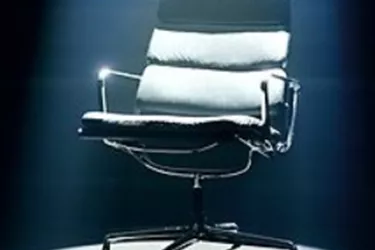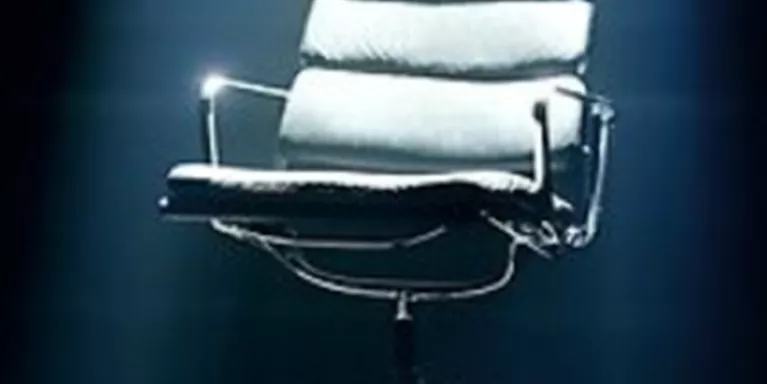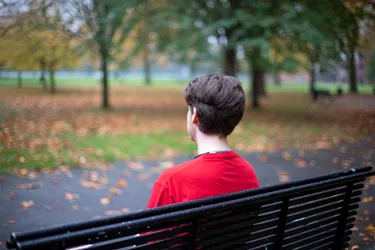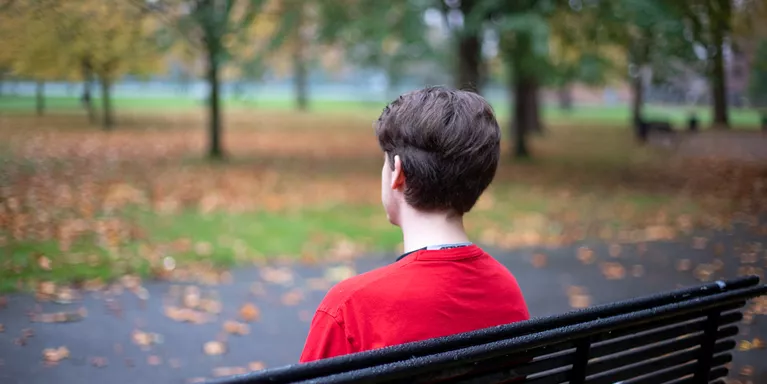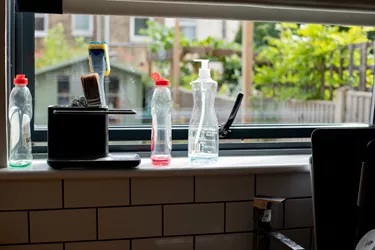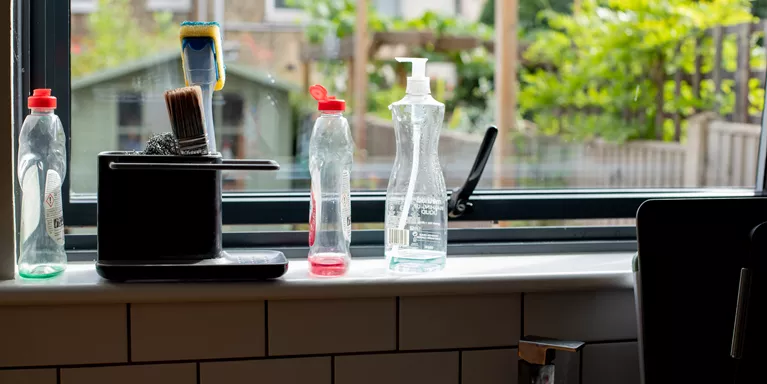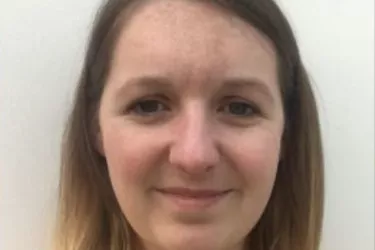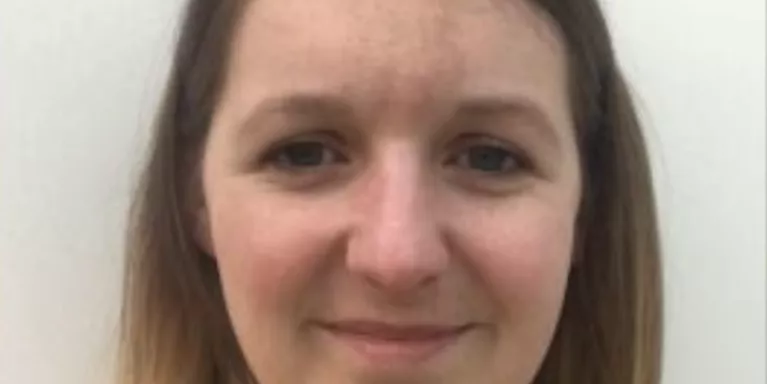'I think I might be dying' - chapter from 'Mad Girl' by Bryony Gordon
In a full-length chapter from her autobiographical book, Mad Girl, Bryony Gordon reveals how a 'privileged twelve-year-old girl living in a terraced house with an Aga' developed mental health problems for the first time. Bryony is a journalist and author who has been living with OCD for the past 20 years.
I think I might be dying
It came to me in a dream. I know that sounds absolutely ridiculous, but it did, I promise you. One moment I was a regular twelve-year-old, working out which one of Take That I would marry, [Preferred order: Robbie, Mark, Howard, Jason, Gary. I know this is controversial and that the list would eventually reverse itself, but bear with me, I was young] praying that I would make it on to the netball A team because the B team would mean another year in social Siberia with my monobrow and the tartan socks my mother insisted I wore to school; the next, I was convinced I was dying of AIDS.
You know. All that normal pre-pubescent girl stuff. I had gone to bed that Sunday night in December 1992 with only a passing knowledge of Acquired Immune Deficiency Syndrome, gleaned almost entirely from an ‘advert’ warning of the dangers of unprotected sex and needle-sharing and umpteen other things that really shouldn’t have bothered a twelve-year-old girl living in a terraced house with an Aga on the outer reaches of west London. I could go entire months without speaking to a boy and it would be years before I was even kissed by one. Recreational drugs were still at least a decade away and even then they never got intravenous. Indeed, on paper, I had absolutely nothing to worry about other than accidentally-on-purpose waking up my baby brother by stomping up the stairs in a huff. I had an annoying little sister who told everyone I farted into glasses, but, goodness, didn’t everyone? Life was good – by any standard, life was great – and there was little to keep me awake at night as I snoozed in my bedroom, decorated with Designers Guild wallpaper that I had plastered over with posters of Take That, much to the horror of my mother. (This was a long time before the phrase ‘first-world problems’ existed, which is a shame, because I would have loved to throw it back at her every time she complained about a border being buggered up by Blu-Tack.)
To give you an idea of just how privileged I was, I should tell you that that afternoon I had actually attended the Smash Hits Poll Winners Party, which felt to me like the Oscars, if the Oscars were hosted by Simon Mayo and the goodie bags included flashing deely-boppers and bright pink whistles. It was the kind of thing most young girls would have given their right eye to go to at the time – most except the ones at my posh, all-girls school (you see? Such privilege) who saw pop music as totally lame and shallow and thought it was way cooler to be into Nirvana, because this showed you existed on a higher plane of consciousness or loftiness or whatever. (I should say that when Take That re-formed in the twenty-first century, and adult- hood made it acceptable to admit to liking them, many of these girls – now grown women who should really have known better – claimed that they had always loved Take That, which I would have found deeply unjust if I hadn’t had better things to do with my time, like shovelling cocaine up my nostrils or drinking my body weight in strong continental lager.)
"I went to bed happy and woke up eight and a bit hours later in a state of turmoil, as if I had been abducted by aliens before being returned to my bed with a chip in my head."
Anyway, I had gone with my primary-school friend Emily, whose father happened to be in the music industry (yet more privilege), and we must have been the picture of innocence. I imagine us in floral dresses and T-bar shoes, because I am nostalgic like that, although in reality it was probably hideous Global Hypercolor T-shirts that blushed pink at the armpits, teamed with leggings and LA Lights trainers – the kind of thing that Hoxton hipsters wear now because they mistakenly believe that wearing things ironically will make them interesting (in much the same way my school friends thought liking Nirvana did). The Smash Hits Poll Winners Party had been a spectacular event for Emily and me, less so for her dad, who spent the whole event with his hands over his ears, looking like a light had gone out behind his eyes. Take That cleaned up, walking away with such accolades as Best Group in the Whole Wide World, Most Fanciable Male, and Best Haircut (Mark, not Robbie, sadly, but still a win all the same). I now see that this must have been deeply demeaning to Mark, his vast musical talents reduced to the follicles on his pretty head, but at the time it made me feel joyous. It was vindication for choosing Take That. Was Kurt Cobain ever going to win best haircut? No! Was Dave Grohl ever going to saunter off with the most fanciable male title? I somehow doubted it.
We skipped out of Kensington Olympia on a high even though it was pouring with rain, and in the car back home we sang ‘Could It Be Magic’ over and over, telling Emily’s dad to be quiet every time a new song came on the radio in case it was a Take That one. This was despite the fact that Emily’s dad hadn’t said anything for nearly two hours, and may have actually been in a catatonic state. I remember getting home and feeling a strange mixture of excitement and embarrassment as I described to my mum how totally amazing Take That were. I remember getting into bed with the sound of my own screams of delight ringing in my ears.
I remember drifting off knowing that I had seen the man I was going to marry (Robbie) and that everything was going to be OK, netball A team or no netball A team. And this is the last time I remember life without darkness in my brain.
When I look back on my life and the mental illness that has defined so much of it, there is pre-dream Bryony, in her imaginary T-bars and Laura Ashley skirts, and there is post-dream Bryony, in Doc Martens and a perpetual frown. People often talk suspiciously of overnight transformations, but this really was one – I went to bed happy and woke up eight and a bit hours later in a state of turmoil, as if I had been abducted by aliens before being returned to my bed with a chip in my head. And who’s to say this didn’t happen? I mean, isn’t it far more plausible than being sent nutso by a series of involuntary images and ideas that flash into your mind while you are unconscious? No. Don’t answer that. Already I am worried that you think I am bonkers.
Anyway, I know that listening to other people’s dreams is only marginally less tedious than transcribing minutes from a meeting about treatment for fungal infections, so I will keep this brief. This may seem like selflessness, but in actual fact my linguistic parsimony is because the dream was as dull as dishwater. It wasn’t particularly vivid or detailed. I remember very little of it, other than that it was the start of a long civil war in my head, the effects of which would every now and then be felt in other parts of my body, as if refugees had fled my brain and sought solace elsewhere – in a gaunt cheekbone, for example, or a pronounced clavicle. Basically, I dreamt that I had an incurable disease. I didn’t look ill, or feel ill. I was up and doing all the things I usually did, including going to school, playing Nintendo and watching The Simpsons. But in my dream a doctor told me I was dying and that was that. No respite. I would be dead in months. Days, maybe.
I remember a friend at a sleepover telling us all, in a terribly serious tone, that if you die in a dream, you die in real life. Perhaps that was why I woke up in a cliché of cold sweat, convinced that it was all over, my nightmare not a fevered dream caused by watching an advert but a terrible premonition of things to come. I had read in a newspaper that people with HIV didn’t know they had it until it was too late and the virus had developed into AIDS. Perhaps this explained why in my dream I had been given a death sentence while outwardly appearing well. Yes, that was it – it made perfect sense. I was dying of AIDS, and I wasn’t even a teenager yet.
I honestly thought I would never become a teenager. Although I don’t remember too much detail of the dream, the weeks afterwards have all the nightmarish detail of a Salvador Dali painting. At school that day everyone chatted excitedly about their weekends and I remember feeling a great weight above my heart because I thought that I would never again be able to do the same. All the joy I had felt after the Smash Hits Poll Winners Party had evaporated. I could scarcely believe that the girl tunelessly singing ‘Could It Be Magic’ the day before was me. During maths I almost wept for the mundane anxiety I used to feel when I couldn’t do quadratic equations. In English I wondered why I had ever panicked about the late handing in of an essay about Shakespeare. These seemed to me such simple worries and I would have given anything for them that first winter of discontent. As it was, all I could think about was how I had managed to catch AIDS, or how I was almost certainly about to catch AIDS, from a splinter in my desk or a rogue needle I hadn’t seen on the tube.
Everywhere I looked, I saw danger. Germs lurked on every surface, even if they weren’t visible. In fact, if they weren’t visible, didn’t that make them more dangerous? I was terrified of the seventies-style seats on the tube, not because they were an eyesore but because they had an orangey hue that I felt could disguise blood stains. In time, I stopped sitting down unless I absolutely had to. It was easier than checking a seat ten, fifteen, twenty times. When the Christmas holidays finally turned up, I simply stopped going out at all.
"For a moment I stopped breathing. I was certain that my heart was trying to escape from my chest. It wanted to burst through my ribcage and out on to the floor of the shop where it would inevitably become infected with some hideous disease."
But I am getting ahead of myself a bit. I developed other idiosyncrasies, too, although the word idiosyncrasy implies they were funny little habits that I had affected in order to provide myself with some depth, like a love of Nirvana, for example. But I would really rather not have had to leave the room every time a Queen song came on (a year before, Freddie Mercury had died of AIDS) so that I could chant the name of Freddie Starr over and over again, Starr being a ‘healthy’ Freddie who would counteract the presence of the ‘unhealthy’ Freddie. I would really rather not have spent hours in the library, reading about lesions and oral thrush and all the other symptoms of AIDS that young girls needn’t learn about, so that I could spot the signs when I eventually developed them. And I would really rather not have then had to run home to scrub my body and wash my hair and throw away my clothes just in case anything nasty had been transferred from the books.
There was no logic to what was going on in my head – a rhyme, maybe, a never-ending death song, but absolutely no reason. My encyclopedic knowledge should have eventually empowered me and reassured me that, actually, everything was fine – unlike many other people in the early nineties, I knew you could not catch HIV from toilet seats or shared cups – but instead it made everything worse. It fed my anxiety instead of starving it. My imagination found ever more alarming ways for danger to strike. I could accidentally step on a discarded hypodermic needle in the park.
I could have been infected by the surgeon who removed my appendix in 1989. I could be in a café and someone could sneeze and the sneeze could contain tiny globules of blood that could land on my eyeballs without me even knowing, your eyeballs being one of the most permeable parts of your body. And who was to say that the disease wouldn’t evolve and become airborne? Scientists, probably, but I wasn’t one of them and I didn’t know any and so off my imagination went, coming up with more and more elaborate ways for me to die before I had reached my thirteenth birthday.
I was so scared of blood on my hands that I began to wash them as often as possible, the irony being that they soon started to crack and bleed. Some people’s hands are covered in liver spots; mine were covered in blood spots. I was Lady Macbeth, without the murderous impulses (I hoped). At night I lay in bed staring hard at the scabs on my red raw hands, checking to see if they had turned green. Green, I had decided in my not very logical way, was a sign of infection. If they were still red, then perhaps everything was fine. I wore gloves as much as I could but this in itself was not without danger, because who knew who had handled them while they were still on sale in the shop? Clothes with pockets posed a similar problem, but in a rare moment of lucidity I reasoned that they were better than nothing.
I would have worn bandages round my hands if I could have.
Christmas was coming and joy was everywhere but I couldn’t share in it. I helped to decorate the tree in the solemn belief that it was probably the last time I would ever do so. The smiling carol singers and the laughing Father Christmasses on the television seemed to make my misery more acute. Everyone’s happiness seemed obscene given what was going on in my head. I simply could not comprehend how normal life could continue when I felt so abnormal.
Just one of those funny things.

Information and support
When you’re living with a mental health problem, or supporting someone who is, having access to the right information - about a condition, treatment options, or practical issues - is vital. Visit our information pages to find out more.
Share your story with others
Blogs and stories can show that people with mental health problems are cared about, understood and listened to. We can use it to challenge the status quo and change attitudes.
Related stories
"At six, I developed a fear of nuclear war."
I had started to hide my toothbrush under my pillow instead of keeping it in the bathroom because I was terrified I would pass my illness to my family. I stopped holding my baby brother, or playing with my annoying little sister, because as annoying as she was I did not want her to die. It was one thing living with the possibility of being ill yourself, quite another with the possibility you might have condemned someone you love to the same fate.
You may be wondering what my parents made of this behaviour, but I am not sure that they even noticed. It was winter, so of course my hands were chapped. I was almost a teenager, so of course I didn’t want to share bathroom things with them or see my friends when school broke up. Of course I wanted to stay in my room staring sullenly at Blu-Tacked borders.
Adolescence was approaching, fast, and nothing about my moodiness and separateness was really that strange. This too will pass, I imagine they said after hearing yet another slammed door.
On Christmas Eve, my mum suggested we go out and buy some last-minute presents. I remember her trying to take my hand only for me to stuff it in my pocket in terror. She must have thought I was embar- rassed by the gesture, her little girl all grown up, when in actual fact I longed to clasp her fingers in mine, to feel the warmth in them and the love. But I was too scared of my blood infecting her, too convinced that I was actually poisonous. A couple of days later she would spin me round the kitchen to the Pogues’ ‘Fairytale of New York’ and for a moment I would laugh uproariously and remember what it was like before I became certain I was dying, but then the reality of my situation snapped back in and I spent the next week convinced this one, tiny gesture had condemned my mother to death.
That Christmas Eve, when she managed to get me out of the house, we went to Woolworths and Our Price and the toy shop on the corner and then finally we went to Boots, to stock up on nappies for my eight- month-old brother, whom I was tasked with looking after in his pram while my mother paid at the counter. But I couldn’t do it, not even for thirty seconds. I knew I couldn’t protect him from the germs, or the diseased people picking up their prescriptions from the pharmacy. What if one of them tried to hold him, or ruffle his hair? For a moment I stopped breathing. I was certain that my heart was trying to escape from my chest. It wanted to burst through my ribcage and out on to the floor of the shop where it would inevitably become infected with some hideous disease. I pushed the pram out while hyperventilating and crying, the people around me presumably trying to work out whether or not to call the police about a potential child abduction. Later that afternoon, having dropped my brother back at home so he could be under the watchful eye of my father and nine-year-old sister, Mum took me to the Christmas fair to try to calm me down. We went on the bumper cars, and for the four and a half minutes we were on them all my worries were suspended, forgotten about, left on the side with the people waiting their go. I counted the minutes on the Flik Flak watch I’d got for my birthday six months before, when everything was normal and fine and happy and I had my whole life ahead of me. I counted those four and a half minutes under my breath, and I wanted them never to end.
I know what you must be thinking. You must be thinking: where on earth did that come from? Was it a manifestation of some abuse I had been suffering from secretly? Nope. None of that. Was it the result of bullying at school, caused by a tricky combination of my monobrow and love of Take That? No. Not that either – I was so utterly mediocre that people barely noticed me, let alone bullied me. Had I had an unhappy childhood, filled with bile and recriminations? Hardly. I lived in a house with an Aga and a cat called Moppet, and the family car was a Volvo.
I suppose, looking back, I was a somewhat anxious child. My stocking was left outside the front door as I thought it unwise to allow a strange man into the house, even if he did come laden down with presents. Surely Father Christmas was the ultimate stranger bearing sweets? I was worried about fire so I kept a small red bell by my bed that would enable me to alert the rest of my family should there be a blazing inferno. When I realised that I might be overcome by the smoke first, I insisted on small red bells for everyone.
As a toddler, I was convinced that there was a monster in the sky every time a storm blew up, and one of my earliest memories is huddling behind the sofa with my mother, hiding from someone I thought was a murderous intruder, although she tells me it would more likely have been a nosy neighbour she didn’t want to see. At six, I developed a fear of nuclear war – you know, monsters under the bed, sleeping in the dark, atom bombs obliterating you in seconds, that kind of thing – and at seven it became of great concern to me that we might have to live at the top of a very high tree. I’d seen a news report about the likelihood of London flooding in the year 2005 due to the Thames Barrier failing because of some catastrophic weather event. This was 1987, so 2005 was a very long way off, but that didn’t stop me from worrying about the logistics of living in said very high tree. Would we have to swim everywhere? Develop gills? Build a boat?
Acid rain was a real worry, as was the hole in the ozone layer. You never hear about these things any more, but in the eighties they were all anyone ever banged on about, an environmental ISIS ready to pounce and destroy at any moment. When I read columns concerned about a generation of children growing up under the scourge of social media and the internet, I think, ‘Spare me! These kids have NO idea how good they’ve got it. You think we had it easier, worrying that our skin was going to burn off and melt away every time it rained, which was often, by the way? You think not having Facebook and Snapchat makes up for the fact that every time we left the house, the sun’s deadly rays could have killed us instantaneously? Man up, children of the twenty-first century! Man up!’ Mad cow disease was a ticking time bomb that lurked in all of our bodies. And as for CFCs, which were lethal and poisonous and in everything, just so you know . . . well, simply putting your deodorant on in the morning had the power to destroy the planet.
My mother bought me a set of Mexican worry dolls to keep under my pillow because in my mind lurked a whole host of things I was certain were going to go bump in the night – Gremlins, the goblins from Labyrinth, Freddy Kreuger, Chucky. Video nasties threatened the very fabric of society. Lights were always left on at bedtime, but daybreak was no guarantee of safety. Public information films, shown to you at school, and then repeated on telly just in case you weren’t traumatised enough, showed children with limbs amputated or being burnt alive after chasing footballs on to train lines or in to electricity pylons.
It was a worrying time to be a child, but then I imagine it is always a worrying time to be a child. And none of these things were, in themselves, reasons for me to have spent two weeks locked in my bedroom, or a Christmas convinced I was dying. I now know that, at the time, my mother and father tried to work out what might have set it off – a new baby in the house that meant we were all obsessed with sterilising and hygiene, perhaps, combined with the fact I was full of pre-pubescent hormones. They didn’t have to speculate too much, thank goodness, because as quickly as my madness had appeared, it was gone again. It was, as they suspected, a phase.










